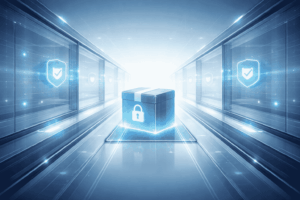

Intellectual property today is more dynamic than ever, with new challenges and opportunities emerging daily. The internet has transformed how IP is created and protected, leading to copyright infringement, patent disputes, and other issues. Luckily, there is a game-changer –– a virtual data room for IP and licensing. These solutions offer secure data sharing and streamlined deal management, making them essential for maximizing your IP’s potential.
If you are ready to supercharge your IP management strategy and accelerate licensing, explore how a data room revolutionizes the licensing process and boosts success.
Clear breakdown of per-page, per-user, and flat-rate structures. Understand hidden costs before you commit.
View Pricing GuideWhat are IP management and licensing deals?
Simply put, IP management maintains and secures a valuable collection of rare artifacts, while licensing deals rent out those artifacts to others for a fee or specific benefit.
In business terms, intellectual property management is the strategic administration and protection of intangible assets within an organization. They typically include patents, copyrights, trademarks, and trade secrets. Effective IP management maximizes assets’ value, secures competitive advantage, and ensures legal compliance.
Source: Four types of intellectual property to protect your idea and how to use them
Licensing deals are agreements where a company allows another party to use its IP assets in exchange for benefits or compensation such as royalties, lump-sum payments, or other forms of remuneration. A licensing deal is typically a complex procedure requiring detailed due diligence to assess the partner’s reliability, financial stability, and adherence to legal and regulatory standards.
👁️🗨️ The U.S. intellectual property licensing market was estimated at approximately $62.18 billion in 2023, up from $43.5 billion in 2013. This substantial growth over a decade reflects the increasing value and importance of IP assets in the economy.
What are the most common IP & licensing use cases?
The most common scenarios where IP licensing is essential include the following:
1. Patent licensing
Companies with valuable patents license them to other entities for a fee. It may involve exclusive or non-exclusive rights, enabling the licensee to use, manufacture, or sell patented technology.
Example: A tech company authorizes a manufacturer to integrate its patented technology into its products.
2. Trademark licensing
Businesses license their trademarks to other companies, permitting them to use brand names and logos. It often involves stringent quality control measures to maintain brand integrity.
Example: A fashion brand licenses its logo to merchandise manufacturers.
3. Copyright licensing
Owners of copyrighted works, such as software, books, or music, license their content for use across various platforms. This can involve exclusive or non-exclusive rights.
Example: A software company grants different developers permission to integrate its application into their systems.
4. Technology transfer
Universities or research institutions license their technology or research findings to commercial entities for further development or commercialization.
Example: A university authorizes a pharmaceutical company to use a new medical device technology.
5. Franchise agreements
Franchisors license their business model, trademarks, and proprietary processes to franchisees, allowing them to operate under the franchisor’s brand.
Example: A fast-food chain grants franchise rights to a new restaurant owner.
6. Mergers and acquisitions
Evaluating IP assets is crucial during M&A transactions. Specifically, responsible parties review a licensing agreement to understand its impact on the overall deal.
Example: An acquiring company assesses a target company’s IP portfolio to determine its value.
7. Joint ventures and partnerships
Companies collaborate on joint ventures or partnerships, sharing IP assets. Licensing agreements often dictate how these assets are used and shared.
Example: Two tech companies might form a joint venture to develop a new product using their combined IP assets.
All these operations can enhance revenue, foster growth, and strengthen market position. However, they are intricate processes that make companies look for dependable tools for the following:
- Secure data sharing
- Effective document management
- Protected data access control
- Streamlined negotiation and collaboration
- Detailed audit trails and reporting
- Risk management and due diligence support
While some businesses use generic platforms to satisfy these needs, others employ virtual data rooms, a specialized tool that addresses all these needs in one system. If this is what you are looking for, we invite you to discover the role of this platform in IP licensing deals and uncover its features that streamline the entire IP lifecycle.
Understanding a VDR’s role in IP and licensing
Here’s how a virtual data room addresses each key IP licensing need, along with the features that support each role:
| IP licensing need | Virtual data room role | Virtual data room features |
| Data sharing | Ensures companies can share confidential IP documents safely with authorized parties | Secure file sharing with advanced encryption High-speed uploads and downloads Document version control File preview without downloading |
| Document management | Automatically organizes files and folders and streamlines the process of managing sensitive intellectual property documents | Automatic index numberingFull-text search Document tagging Multiple file format support |
| Data access control | Controls and restricts access to documents based on user roles and permissions | User role-based permissions Granular document access settings Multi-factor authentication Dynamic watermarking |
| Negotiation and collaboration | Facilitates licensing negotiations and collaboration between stakeholders | Q&A module Comments Annotations Private and group chats |
| Audit trails and reporting | Provides comprehensive logs and reports on document access and changes | Detailed audit trails of document access and user activities Customizable analytics Comprehensive activity logs Exportable reports for regulatory compliance |
| Risk management and due diligence support | Supports risk evaluation and due diligence by providing comprehensive tools for assessing potential issues and ensuring thorough review processes | Due diligence reports Secure document storage for sensitive data Integration with external due diligence tools |
👁️🗨️ Check out the following examples of data room features:
Q&A module
Activity logs
Virtual data rooms offer more features that meet diverse IP licensing needs beyond those highlighted. So, visit the official websites of the best VDR providers for a comprehensive overview of all available functionalities.
What are the benefits of using a data room for IP management and licensing?
Based on the roles and features mentioned above, we can outline the key benefits of using virtual data rooms for IP licensing.
1. Simplified workflows
Data rooms foster a more organized and manageable process for IP licensing deals involving multiple stakeholders and intricate agreements. Specifically, the solution provides a structured document management and collaboration environment, leading to smoother and more effective deal execution.
2. Enhanced data security
The software protects sensitive intellectual property and licensing information against unauthorized access and data breaches. Thus, deal parties can proceed with negotiations and finalizing agreements, knowing their valuable assets are secure throughout the transaction.
3. Greater transparency
Since all stakeholders have a clear view of document interactions and user activities, they ensure accountability and reduce disputes. Moreover, this level of transparency improves communication and coordination among parties, leading to more effective deal flow.
4. Effective collaboration
The ability to share documents instantly, provide feedback, and discuss terms directly within the platform fosters more transparent communication and negotiations. Furthermore, it reduces delays and misunderstandings.
5. Accelerated decision-making
Data rooms streamline the due diligence process by providing instant access to all relevant data. This rapid availability speeds up decision-making, allowing parties to review and respond to licensing proposals quickly.
6. Streamlined compliance
Data rooms simplify compliance with regulatory requirements by consolidating all necessary documentation and processes into one secure platform. Thus, all parties can easily access and verify compliance-related information, reducing the complexity and effort involved in meeting regulatory standards.
.Now that we’ve discussed a VDR’s best features and benefits, let’s take a look at expert recommendations for the best-suited solutions for IP licensing deals.
Best data rooms for IP management and licensing
We have analyzed many virtual data rooms based on features, ease of use, user reviews, and pricing. The most reliable options available today include the following:
| Provider | Top features | Technical support | Free trial | Rating (according to Capterra) |
| Ideals | Multi-layered data encryption Real-time data backup Secure fence view Automatic index numbering Eight levels of document permissions Advanced Q&A module Full audit trails Heat map reports | 24/7 chat, phone, email, and dedicated experts | 30 days | 4.8 |
| Ansarada | 256-bit SSL/TLS encryption View-only access Web-based spreadsheets viewer Q&A module Scheduled reports Exportable reports to Excel | 24/7 chat, phone, and email | 14 days | 4.7 |
| Datasite | Two-factor authentication Customizable document watermarks Remote data shred Scroll-through document viewer Automatic index numbering Secure user messaging Real-time audit trails | 24/7 email and chat; phone support is available in the US, EMEA, and APAC only | 14 days | 4.7 |
Now, let’s take a peek at the top virtual data rooms’ interfaces.
1. Ideals interface
Source: Ideals Virtual Data Rooms Overview | dataroom-providers.org
2. Ansarada interface
Source: Ansarada – Startup Stash
3. Datasite interface
Source: Merrill Datasite Data Room Overview | dataroom-providers.org
Conclusion
Proactive steps in intellectual property management significantly enhance the utilization of IP assets, while licensing deals help companies capitalize on these assets effectively. Virtual data rooms facilitate smooth and secure data sharing, organized document management, and enhanced collaboration for IP management and licensing. So, to optimize an IP strategy and streamline licensing processes, integrate a virtual data room into your operations today.
FAQ
1. What is intellectual property management?
Intellectual property management involves overseeing and protecting intangible assets like patents, trademarks, copyrights, and trade secrets to ensure their proper use and value.
2. What should I consider before entering into an IP licensing deal?
Assess the value of your IP, the potential partner’s capabilities, the terms of the license, and how the deal aligns with your business strategy.
3. How do I negotiate an IP licensing agreement?
Negotiating an IP licensing agreement involves defining the terms of use, determining compensation, setting the duration of the license, and outlining limitations or obligations.
4. How can virtual data rooms help with IP management and licensing?
Virtual data rooms facilitate data sharing, document management, and collaboration, which are essential for managing and negotiating IP deals.
5. What are the benefits of using a virtual data room for IP management and licensing?
Data rooms provide robust security with advanced encryption and access controls, ensuring IP information is well-protected. Moreover, they streamline document management by organizing and making it easy to retrieve documents. Collaboration is seamless, as multiple stakeholders can access and review data simultaneously. Also, real-time updates keep everyone informed with the most current information, while comprehensive audit trails provide transparency and accountability.
Recommended for you


